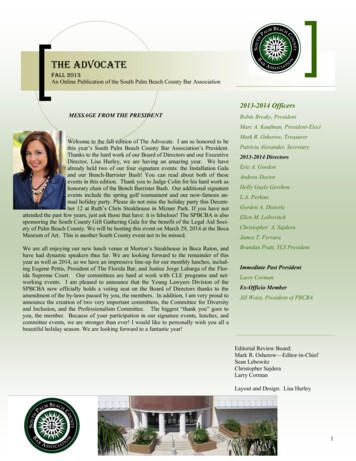
Transcription
THELAW OFSUCCESSIN SIXTEEN LESSONSTeaching, for the First Time in theHistory of the World, the True Philosophy upon which all Personal Successis Built.BYNAPOLEON HILL1928PUBLISHED BYThe RALSTON UNIVERSITY PRESSMERIDEN, CONN.
C OPYRIGHT , 1928,BYNAPOLEON HILLAll Rights ReservedPrinted in the U.S.A.-2-
Lesson FiveINITIATIVE ANDLEADERSHIP-3-
WHENyoudonotknow what to do orwhichwaytoturn,smile. This will relaxyour mind and let thesunshine of happinessinto your soul.-4-
THE LAW OF SUCCESSLesson FiveINITIATIVE AND LEADERSHIP"You Can Do It if You Believe You Can!”BEFORE you proceed to the mastery of thislesson your attention is directed to the fact that thereis perfect co-ordination of thought running throughoutthis course.You will observe that the entire sixteen lessonsharmonize and blend with each other so that theyconstitute a perfect chain that has been built, link bylink, out of the factors that enter into the developmentof power through organized effort.You will observe, also, that the same fundamentalprinciples of Applied Psychology form the foundationof each of these sixteen lessons, although differentapplication is made of these principles in each of thelessons.This lesson, on Initiative and Leadership, followsthe lesson on Self-confidence for the reason that noone could become an efficient leader or take theinitiative in any great undertaking without belief inhimself.Initiative and Leadership are associated terms in-5-
this lesson for the reason that Leadership is essentialfor the attainment of Success, and Initiative is thevery foundation upon which this necessary quality ofLeadership is built. Initiative is as essential to successas a hub is essential to a wagon wheel.And what is Initiative?It is that exceedingly rare quality that prompts nay, impels - a person to do that which ought to bedone without being told to do it. Elbert Hubbardexpressed himself on the subject of Initiative in thewords:"The world bestows its big prizes, both in moneyand honors, for one thing, and that is Initiative."What is initiative? I'll tell you: It is doing theright thing without being told."But next to doing the right thing without beingtold is to do it when you are told once. That is say, Carry the message to Garcia.' Those who can carry amessage get high honors, but their pay is not alwaysin proportion."Next, there are those who do the right thingwhen necessity kicks them from behind, and these 'getindifference instead of honors, and a pittance for pay."This kind spend most of the time polishing abench with a hard luck story."Then, still lower down in the scale than this wehave the fellow who will not do the right thing evenwhen someone goes along to show him how and staysto see that he does it; he is always out of a job, areceives the contempt he deserves, unless he has arich pa, in which case destiny patiently waits aroundt116 comer with a stuffed club."To which class do you belong?"-6-
Inasmuch as you will be expected to takeinventory of yourself and determine which of thefifteen factors of this course you need most, after youhave completed the sixteenth lesson, it may be well ifyou begin to get ready for this analysis by answeringthe question that Elbert Hubbard has askedTo which class do you belong?One of the peculiarities of Leadership is the factthat it is never found in those who have not acquiredthe habit of taking the initiative. Leadership issomething that you must invite yourself into; it willnever thrust itself upon you. If you will carefullyanalyze all leaders whom you know you will see thatthey not only exercised Initiative, but they went abouttheir work with a definite purpose in mind. You willalso see that they possessed that quality described inthe third lesson of this course, Self-confidence.These facts are mentioned in this lesson for thereason that it will profit you to observe thatsuccessful people make use of all the factors coveredby the sixteen lessons of the course; and, for the moreimportant reason that it will profit you to understandthoroughly the principle of organized effort which thisReading Course is intended to establish in your mind.This seems an appropriate place to state that thiscourse is not intended as a short-cut to success, nor isit intended as a mechanical formula that you may usein noteworthy achievement without effort on yourpart. The real value of the course lies in the use thatyou will make of it, and not in the course itself. Thechief purpose of the course is to help you develop inyourself the fifteen qualities covered by the sixteen-7-
lessons of the course, and one of the most importantof these qualities is Initiative, the subject of thislesson.We will now proceed to apply the principle uponwhich this lesson is founded by describing, in detail,just how it served successfully to complete a businesstransaction which most people would call difficult.In 1916 I needed 25,000.00 with which to createan educational institution, but I had neither this sumnor sufficient collateral with which to borrow itthrough the usual banking sources. Did I bemoan myfate or think of what I might accomplish if some richrelative or Good Samaritan would come to my rescueby loaning me the necessary capital?I did nothing of the sort!I did just what you will be advised, throughoutthis course, to do. First of all, I made the securing ofthis capital my definite chief aim. Second, I laid out acomplete plan through which to transform this aiminto reality. Backed by sufficient Self-confidence andspurred on by Initiative, I proceeded to put my planinto action. But, before the "action" stage of the planhad been reached, more than six weeks of constant,persistent study and effort and thought were embodiedin it. If a plan is to be sound it must be built ofcarefully chosen material.You will here observe the application of theprinciple of organized effort, through the operation ofwhich it is possible for one to ally or associate severalinterests in such a way that each of these interests isgreatly strengthened and each supports all the others,just as one link in a chain supports all the other links.I wanted this 25,000.00 in capital for the pur--8-
pose of creating a school of Advertising andSalesmanship. Two things were necessary for theorganization of such a school. One was the 25,000.00capital, which I did not have, and the other was theproper course of instruction, which I did have. Myproblem was to ally myself with some group of menwho needed that which I had, and who would supplythe 25,000.00. This alliance had to be made througha plan that would benefit all concerned.After my plan had been completed, and I wassatisfied that it was equitable and sound, I laid itbefore the owner of a well known and reputablebusiness college which just then was findingcompetition quite keen and was badly in need of aplan for meeting this competition.My plan was presented in about these words:Whereas, you have one of the most reputablebusiness colleges in the city; and,Whereas, you need some plan with which to meetthe stiff competition in your field; and,Whereas, your good reputation has provided youwith all the credit you need; and,Whereas, I have the plan that will help you meetthis competition successfully.Be it resolved, that we ally ourselves through aplan that will give you that which you need and at thesame time supply me with something which I need.Then I proceeded to unfold my plan, further, inthese words:I have written a very practical course onAdvertising and Salesmanship. Having built thiscourse out of my actual experience in training anddirecting salesmen and my experience in planning and-9-
hbeyoumeas-mathematicalexactness by the serviceyou render.- 10 -
Directing many successful advertising campaigns, Ihave back of it plenty of evidence of its soundness.If you will use your credit in helping market thiscourse I will place it in your business college, as oneof the regular departments of your curriculum and takeentire charge of this newly created department. Noother business college in the city will be able to meetyour competition, for the reason that no other collegehas such a course as this. The advertising that you doin marketing this course will serve, also, to stimulatethe demand for your regular business course. You maycharge the entire amount that you spend for thisadvertising, to my department, and the advertising billwill be paid out of that department, leaving you theaccumulative advantage that will accrue to your otherdepartments without cost to you.Now, I suppose you will want to know where Iprofit by this transaction, and I will tell you. I wantyou to enter into a contract with me in which it willbe agreed that when the cash receipts from mydepartment equal the amount that you have paid out orcontracted to pay out for advertising, my departmentand my course in Advertising and Salesmanshipbecome my own and I may have the privilege ofseparating this department from your school andrunning it under my own name.The plan was agreeable and the contract wasclosed.(Please keep in mind that my definite purpose wasto secure the use of 25,000.00 for which I had nosecurity to offer.)In a little less than a year the Business Collegehad paid out slightly more than 25,000.00 foradvertising and marketing my course and the other ex-- 11 -
penses incidental to the operation of this newlyorganized department, while the department hadcollected and, turned back to the College, in tuitionfees, a sum equaling the amount the College hadspent, and I took the department over, as a going andself-sustaining business, according to the terms of mycontract.As a matter of fact this newly created departmentnot only served to attract students for the otherdepartments of the College, but at the same time thetuition fees collected through this new departmentwere sufficient to place it on a self-sustaining basisbefore the end of the first year.Now you can see that while the College did not'loan me one penny of actual capital, it neverthelesssupplied me with credit which served exactly the samepurpose.I said that my plan was founded upon equity; thatit contemplated a benefit to all parties concerned. Thebenefit accruing to me was the use of the 25,000.00,which resulted in an established and self-sustainingbusiness by the end of the first year. Theenefit accruing to the college was the studentssecured cured for its regular commercial and businesscourse as a result of the money spent in advertisingmy department, all advertising having been done underthe name of the College.Today that business college is one of the mostsuccessful schools of its kind, and it stands as amonument of sound evidence with which todemonstrate the value of allied effort.This incident has been related, not alone becauseit shows the value of initiative and leadership, but forthe reason that it leads up to the subject covered by- 12 -
the next lesson of this Reading Course on the Law ofSuccess, which is imagination.There are generally many plans through theoperation of which a desired object may be achieved,and it often happens to be true that the obvious andusual methods employed are not the best. The usualmethod of procedure, in the case related, would havebeen that of borrowing from a bank. You can see thatthis method was impractical, in this case, for thereason that no collateral was available.A great philosopher once said: "Initiative is thepass-key that opens the door to opportunity."I do not recall who this philosopher was, but Iknow that he was great because of the soundness ofhis statement.We will now proceed to outline the exactprocedure that you must follow if you are to become aperson of initiative and ation and eliminate it from your make-up.This habit of putting off until tomorrow that whichyou should have done last week or last year or a scoreof years ago is gnawing at the very vitals of yourbeing, and you can accomplish nothing until youthrow it off.The method through which you eliminateprocrastination is based upon a well known andscientifically tested principle of psychology which hasbeen referred to in the two preceding lessons of thiscourse as Autosuggestion.Copy the following formula and place itconspicuously in your room where you will see it asyou retire at night and as you arise in the morning:- 13 -
INITIATIVE AND LEADERSHIPHaving chosen a definite chief aim as my lifework I now understand it to be my duty to transformthis purpose into reality.Therefore, I will form the habit of taking somedefinite action each day that will carry me one stepnearer the attainment of my definite chief aim.I know that procrastination is a deadly enemy ofall who would become leaders in any undertaking, andI will eliminate this habit from my make-up by:(a) Doing some one definite thing each day, thatought to be done, without anyone telling me to do it.(b) Looking around until I find at least one thingthat I can do each day, that I have not been in thehabit of doing, and that will be of value to others,without expectation of pay.(c) Telling at least one other person, each day, ofthe value of practicing this habit of doing somethingthat ought to be done without being told to do it.I can see that the muscles of the body becomestrong in proportion to the extent to which they areused, therefore I understand that the habit of initiativealso becomes fixed in proportion to the extent that itis practiced.I realize that the place to begin developing thehabit of initiative is in the small, commonplace thingsconnected with my daily work, therefore I will go atmy work each day as if I were doing it solely for thepurpose of developing this necessary habit ofinitiative.I understand that by practicing this habit of- 14 -
taking the initiative in connection with my daily workI will be not only developing that habit, but I will alsobe attracting the attention of those who will placegreater value on my services as a result of thispractice.Signed .Regardless of what you are now doing, every daybrings you face to face with a chance to render someservice, outside of the course of your regular duties,that will be of value to others. In rendering thisadditional service, of your own accord, you of courseunderstand that you are not doing so with the object ofreceiving monetary pay. You are rendering thisservice because it provides you with ways and meansof exercising, developing and making stronger theaggressive spirit of initiative which you must possessbefore you can ever become an outstanding figure inthe affairs of your chosen field of life-work.Those who work for money alone, and whoreceive for their pay nothing but money, are alwaysunderpaid, no matter how much they receive. Money isnecessary, but the big prizes of life cannot bemeasured in dollars and cents.No amount of money could possibly be made totake the place of the happiness and joy and pride thatbelong to the person who digs a better ditch, or buildsa better chicken coop, or sweeps a cleaner floor, orcooks a better meal. Every normal person loves tocreate something that is better than the average. Thejoy of creating a work of art is a joy that cannot bereplaced by money or any other form of materialpossession.I have in my employ a young lady who opens,- 15 -
WHAThelpedovertheyougreatobstacles of life?" wasasked of a highly successful man. "The otherobstacles," he replied.- 16 -
assorts and answers much of my personal mail. Shebegan in my employ more than three years ago. Thenher duties were to take dictation when she was askedto do so. Her salary was about the same as that whichothers receive for similar service. One day I dictatedthe following motto which I asked her to typewrite forme:Remember that your only limitation is the onethat you set up in your own mind.As she handed the typewritten page back to meshe said, "Your motto has given me an idea that isgoing to be of value to both you and me."I told her I was glad to have been of service toher. The incident made no particular impression on mymind, but from that day on I could see that it hadmade a tremendous impression on her mind. She beganto come back to the office after supper and performedservice that she was neither paid for nor expected toperform. Without anyone telling her to do it she beganto bring to my desk letters that she had answered forme. She had studied my style and these letters wereattended to as well as I could have done it; in someinstances much better. She kept up this habit until mypersonal secretary resigned. When I began to look forsomeone to take his place, what was more natural thanto turn to this young woman to fill the place. Before Ihad time to give her the position she took it on herinitiative. My personal mail began to come to my deskwith a new secretary's name attached, and she was thatsecretary. On her own time, after hours, withoutadditional pay, she had prepared herself for the bestposition on my staff.But that is not all. This young lady became so- 17 -
noticeably efficient that she began to attract theattention of others who offered her attractivepositions. I have increased her salary many times andshe now receives a salary more than four times aslarge as the amount she received when she first wentto work for me as an ordinary stenographer, and, totell you the truth, I am helpless in the matter, becauseshe has made herself so valuable to me that I cannotget along without her.That is initiative transformed into practical,understandable terms. I would be remiss in my dutiesif I failed to direct your attention to an advantage,other than a greatly increased salary, that this younglady's initiative has brought her. It has developed inher a spirit of cheerfulness that brings her happinesswhich most stenographers never know. Her work is notwork-it is a great interesting game at which she isplaying. Even though she arrives at the office ahead ofthe regular stenographers and remains there long afterthey have watched the clock tick off five o'clock andquitting time, her hours are shorter by far than arethose of the other workers. Hours of labor do not dragon the hands of those who are happy at their work.This brings us to the next step in our descriptionof the exact procedure that you must follow indeveloping initiative and leadership.Second: You of course understand that the onlyway to get happiness is by giving it away, to others.The same applies to the development of initiative.You can best develop this essential quality in yourselfby making it your business to interest those aroundyou in doing the same. It is a well known fact that a- 18 -
man learns best that which he endeavors to teachothers. If a man embraces a certain creed or religiousfaith, the first thing he does is to go out and try to"sell" it to others. And in exact proportion to theextent to which he impresses others does he impresshimself.In the field of salesmanship it is a well knownfact that no salesman is successful in selling othersuntil he has first made a good job of selling himself.Stated conversely, no salesman can do his best to sellothers without sooner or later selling himself thatwhich he is trying to sell to others.Any statement that a person repeats over and overagain for the purpose of inducing others to believe it,he, also, will come to believe, and this holds goodwhether the statement is false or true.You can now see the advantage of making it yourbusiness to talk initiative, think initiative, eatinitiative, sleep initiative and practice initiative. Byso doing you are becoming a person of initiative andleadership, for it is a well known fact that people willreadily, willingly and voluntarily follow the personwho shows by his actions that he is a person ofinitiative.In the place where you work or the community inwhich you live you come in contact with other people.Make it your business to interest every one of themwho will listen to you, in the development ofinitiative. It will not be necessary for you to give yourreasons for doing th is, nor will it be necessary for youto announce the fact that you are doing it. Just goahead and do it. In your own mind you willunderstand, of course, that you are doing it because- 19 -
this practice will help you and will, at least, do thosewhom you influence in the same practice no harm.If you wish to try an experiment that will proveboth interesting and profitable to you, pick out someperson of your acquaintance whom you know to be aperson who never does anything that he is notexpected to do, and begin selling him your idea ofinitiative. Do not stop by merely discussing thesubject once; keep it up every time you have aconvenient opportunity. Approach the subject from adifferent angle each time. If you go at this experimentin a tactful and forceful manner you will soon observea change in the person on whom you are trying theexperiment.And, you will observe something else of moreimportance still: You will observe a change inyourself!Do not fail to try this experiment.You cannot talk initiative to others withoutdeveloping a desire to practice it yourself. Throughthe operation of the principle of Auto-suggestionevery statement that you make to others leaves itsimprint on your own subconscious mind, and thisholds good whether your statements are false or true.You have often heard the saying: "He who livesby the sword will die by the sword."Properly interpreted, this simply means that weare constantly attracting to ourselves and weaving intoour own characters and personalities those qualitieswhich our influence is helping to create in others. Ifwe help others develop the habit of initiative, we, inturn, develop this same habit. If we sow the seeds ofhatred and envy and discouragement in others, we, inturn, develop these qualities in ourselves. Thisprinciple through which a man comes to resemble in- 20 -
his own nature those whom he most admires is fullybrought out in Hawthorne's story, The Great StoneFace, a story that every parent should have hisoffspring read.We come, now, to the next step in our descriptionof the exact procedure that you must follow indeveloping initiative and leadership.Third: Before we go further let it be understoodwhat is meant by the term "Leadership," as it is usedin connection with this Reading Course on the Law ofSuccess. There are two brands of leadership, and oneof them is as deadly and destructive as the other ishelpful and constructive. The deadly brand, whichleads not to success, but to absolute failure, is thebrand adopted by pseudo-leaders who force theirleadership on unwilling followers. It will not benecessary here to describe this brand or to point outthe fields of endeavor in which it is practiced, withthe exception of the field of war, and in this field wewill mention but one notable example, that ofNapoleon.Napoleon was a leader; there can be no doubtabout this, but he led his followers and himself todestruction. The details are recorded in the history ofFrance and the French people, where you may studythem if you choose.It is not Napoleon's brand of leadership that isrecommended in this course, although I will admit thatNapoleon possessed all the necessary fundamentals forgreat leadership, excepting one-he lacked the spirit ofhelpfulness to others as an objective. His desire forthe power that comes through leadership was basedsolely upon self-aggrandizement. His desire forleadership was built upon personal ambition and not- 21 -
CHERISHyourvisionsand your dreams as theyare the children of yoursoul; the blue-prints ofyourultimatements.- 22 -achieve-
upon the desire to lift the French people to a higherand nobler station in the affairs of nations.The brand of leadership that is recommendedthrough this course of instruction is the brand whichleads to self-determination and freedom and selfdevelopment and enlightenment and justice. This isthe brand that endures. For example, and as a contrastwith the brand of leadership through which Napoleonraised himself into prominence, consider our ownAmerican commoner, Lincoln. The object of hisleadership was to bring truth and justice andunderstanding to the people of the United States. Eventhough he died a martyr to his belief in this brand ofleadership, his name has been engraved upon the heartof the world in terms of loving kindliness that willnever bring aught but good to the world.Both Lincoln and Napoleon led armies in warfare,but the objects of their leadership were as different asnight is different from day. If it would give you abetter understanding of the principles upon which thisReading Course is based, you could easily be cited toleadership of today which resembles both the brandthat Napoleon employed and that which Lincoln madethe foundation of his life-work, but this is notessential; your own ability to look around and analyzemen who take the leading parts in all lines ofendeavor is sufficient to enable you to pick out theLincoln as well as the Napoleon types. Your ownjudgment will help you decide which type you preferto emulate.There can be no doubt in your mind as to thebrand of leadership that is recommended in thisReading Course, and there should be no question in- 23 -
your mind as to which of the two brands described youwilladoptasyourbrand.Wemakenorecommendations on this subject, however, for thereason that this Reading Course has been prepared asa means of laying before its students the fundamentalprinciples upon which power is developed, and not asa preachment on ethical conduct. We present both theconstructive and the destructive possibilities of theprinciples outlined in this course, that you maybecome familiar with both, but we leave entirely toyour own discretion the choice and application ofthese principles, believing that your own intelligencewill guide you to make a wise selection.THE PENALTY OF LEADERSHIP*In every field of human endeavor, he that is firstmust perpetually live in the white light of publicity.Whether the leadership be vested in a man or in amanufactured product, emulation and envy are ever atwork.In art, in literature, in music, in industry, thereward and the punishment are always the same. Thereward is widespread recognition; the punishmentsfierce denial and detraction.When a man's work becomes a standard for thewhole world, it also becomes a target for the shafts ofthe envious few. If his work be merely mediocre, hewill be left severely alone - if he achieve amasterpiece, it will set a million tongues a-wagging.Jealousy does not protrude its forked tongue atthe artist who produces a commonplace painting.*(With the compliments of the Cadillac Motor Car Co.)- 24 -
Whatsoever you write, or paint, or play, or singor build, no one will strive to surpass or slander you,unless your work be stamped with the seal of a genius.Long, long after a great work or a good work hasbeen done, those who are disappointed or enviouscontinue to cry out that it cannot be done.Mean voices were raised against the author of theLaw of Success before the ink was dry on the firsttextbooks. Poisoned pens were released against boththe author and the philosophy the moment the firstedition of the course was printed.Spiteful little voices in the domain of art wereraised against our own Whistler as a mountebank, longafter the big world acclaimed him its greatest artisticgenius.Multitudes flocked to Beyreuth to worship at themusical shrine of Wagner, while the little group ofthose whom he had dethroned and displaced arguedangrily that he was no musician at all.The little world continued to protest that Fultoncould never build a steamboat, while the big worldflocked to the river banks to see his boat steam by.Small, narrow voices cried out that Henry Fordwould not last another year, but above and beyond thedin of their childish prattle Ford went silently abouthis business and made himself the richest and mostpowerful man on earth.The leader is assailed because he is a leader, andthe effort to equal him is merely added proof of hisleadership.Failing to equal or to excel, the follower seeks todepreciate and to destroy - but only confirms thesuperiority of that which he strives to supplant.There is nothing new in this.- 25 -
It is as old as the world and as old as the humanpassions - envy, fear, greed, ambition and the desireto surpass.And it all avails nothing.If the leader truly leads, he remains the LEADER!Master-poet, master-painter, master-workman,each in his turn is assailed, and each holds his laurelsthrough the ages.That which is good or great makes itself known,no matter how loud the clamor of denial.A real leader cannot be slandered or damaged bylies of the envious, because all such attempts serveonly to turn the spot-light on his ability, and realability always finds a generous following.Attempts to destroy real Leadership is love'slabor lost, because that which deserves to live, lives!········We come back, now, to the discussion of the thirdstep of the procedure that you must follow indeveloping initiative and leadership. This third steptakes us back for a review of the principle oforganized effort, as described in the preceding lessonsof this course.You have already learned that no man canaccomplish enduring results of a far-reaching naturewithout the aid and co-operation of others. You havealready learned that when two or more persons allythemselves in any undertaking, in a spirit of harmonyand understanding, each person in the alliance therebymultiplies his own powers of achievement. Nowhere isthis principle more evidenced than it is in an industryor business in which there is perfect team-work be-- 26 -
tween the employer and the employees. Wherever youfind this team-work you find prosperity and goodwillon both sides.Co-operation is said to be the most importantword in the English language. It
LAW OF SUCCESS IN SIXTEEN LESSONS Teaching, for the First Time in the History of the World, the True Philos-ophy upon which all Personal Success is Built. BY NAPOLEON HILL 1 9 2 8










